COUNT
PH slides to top 4 in Kaspersky’s new global ranking of countries most targeted by online threats
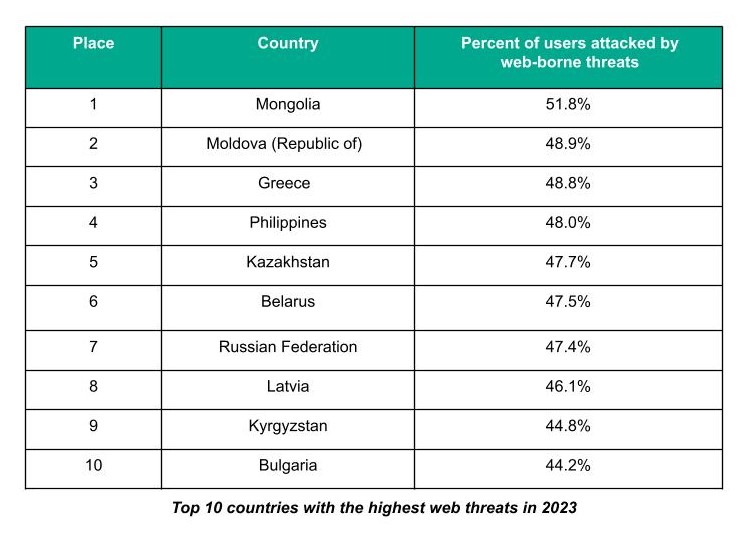
February 5, 2024 9:46 p.m.
In 2023, web threats targeting the Philippines were about two percent less (48%) than in 2022 (49.8%), according to the latest Kaspersky Security Network (KSN) report.
With this new data, the country moved two spots down to fourth place worldwide among countries most targeted by malicious files from the internet and phishing websites. It looks like a positive development but Kaspersky is strongly advising against dropping the armor.
“There are two things that could explain the drop in web threats, albeit slightly. First is that we see the country is slowly making headway in cybersecurity. We classify the Philippines to be in the intermediate group of countries that are identifying cyberattacks and making efforts to implement rules. The second one and this we have to seriously take note, is that cybercriminals are continuously taking other attack routes that might be off the radar. One trend that we consistently have been seeing lately is their preference for targeted attacks instead of the spray and pray method,” said Yeo Siang Tiong, General Manager for Southeast Asia at Kaspersky.
“Complacency, however, is still not an option. Cybercriminals continue to develop their tools and techniques. They actually surprise cybersecurity experts all the time. Our mindset should be how to be able to hunt threats before they could cause harm and damage. At this point, I recommend that we should be talking more about threats as we proactively learn to detect and respond to them. This is where threat intelligence comes in handy,” added Yeo.
Web or online threats are attacks through browsers which are also cybercriminals’ tried and tested way to spread malware. It can easily be done with or without the involvement of the victim.
A web attack with victim participation is done through social engineering. The victim is tricked into doing something that jeopardizes their personal security or the security of the organization they work for. The objective is to get the victim to respond by clicking an infected email attachment, a compromised website, or responding to a fake unsubscribe notice, among others. Last year’s data breaches involving a government agency and an e-wallet company, which were each reportedly traced to phishing, are examples of this type of web threat.
An attack requiring no victim involvement is through drive-by downloads. By simply visiting a compromised website, their device gets infected automatically (and silently) particularly if they failed to apply a security update to one of their apps. This method is used in most web attacks.
In the recent global ranking, the Philippines came behind Mongolia (51.8%), Moldova (48.9%) and Greece (48.8%). Since 2019, the country has consistently been in the top 10 ranking countries.
Among Southeast Asian countries, the Philippines is trailed by Malaysia with the overall percentage of users attacked by web-borne threats from January to December 2023.
To stay protected, Kaspersky recommends users the following:
- Do not download and install applications from untrusted sources
- Do not click on any links from unknown sources or suspicious online advertisements
- Create strong and unique passwords, including a mix of lower case and upper case letters, numbers, and punctuation, as well as activating two-factor authentication
- Always install updates
- Ignore messages asking to disable security systems for office or cybersecurity solution
- Use a robust cybersecurity solution appropriate to your system type and devices
For organizations, Kaspersky recommends the following:
- Always keep software updated on all the devices to prevent attackers from infiltrating network by exploiting vulnerabilities
- Use strong passwords to access corporate services. Use multi-factor authentication for access to remote services
- Choose a proven endpoint cybersecurity solution for business that is equipped with behaviors-based detection and anomaly control capabilities for effective protection against known and unknown threats
- Use dedicated set of effective endpoint protection, threat detection and response products to timely detect and remediate even new and evasive threats
- Use the latest threat intelligence information to empower your security experts
COUNT
Isambard-AI, the UK’s most powerful AI supercomputer, goes live
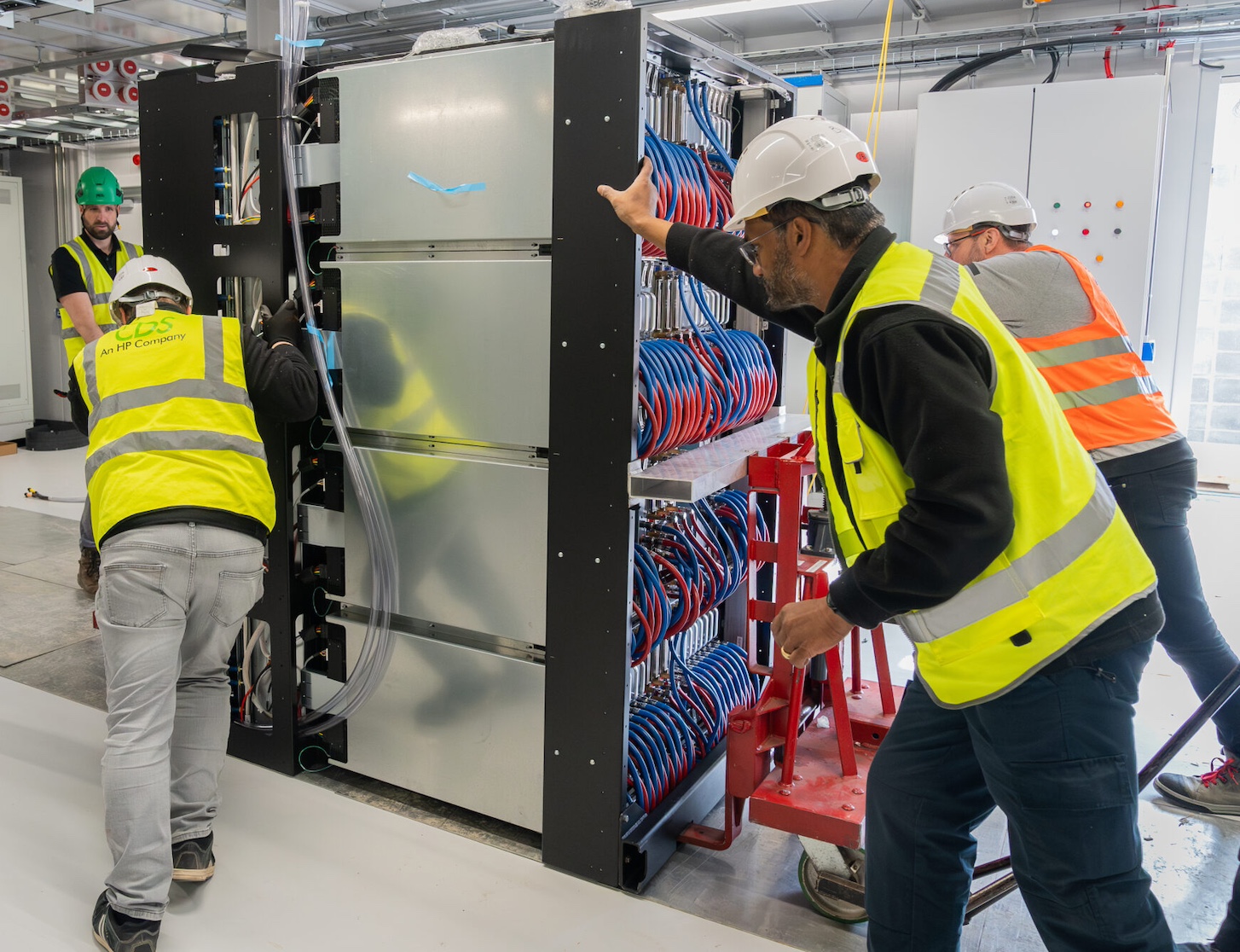
6:39 p.m. July 18, 2025
(NVIDIA PR) The U.K. has officially joined the premier league of global AI infrastructure — and it’s not starting small.
At a ribbon-cutting ceremony at the Bristol Centre for Supercomputing (BriCS), leaders today unveiled Isambard-AI, the most powerful AI supercomputer ever built in the U.K.
U.K. Secretary of State Peter Kyle was joined by leaders from across academia, industry and government, including Simon McIntosh-Smith, director of the Bristol Centre for Supercomputing, and Neil MacDonald, executive vice president and general manager for Hewlett Packard Enterprise’s server business.
“And as we press this switch to activate the UK’s most powerful supercomputer, we are embarking on Britain’s super future where AI contributes towards the delivery of better public services, greater public prosperity, deeper scientific discovery and stronger national security,” Kyle said.
The numbers back up Kyle’s statement:
- 21 exaflops of AI performance
- 5,448 NVIDIA GH200 Grace Hopper Superchips
- Set to rank 11th worldwide on the latest TOP500 list of world’s fastest supercomputers
- More than 10x faster than the next-fastest supercomputer in the U.K. More computing power than all other U.K. supercomputers combined
- Ranked fourth globally for energy efficiency
Engineering teams working collaboratively to maneuver and install components within the supercomputer’s data hall, illustrating the complex and coordinated effort behind the build.
Why It Matters
Isambard-AI gives U.K. researchers and businesses a once-in-a-generation leap in computing power. It’s a platform to accelerate breakthroughs in:
- AI-driven drug discovery
- Advanced climate modeling
- Materials science
- Large language models (LLMs) tuned to U.K. languages and laws
Backed by £225 million in government investment and built with NVIDIA, HPE, the University of Bristol and others, Isambard-AI signals a clear ambition: to lead in AI, the U.K. must lead in compute.
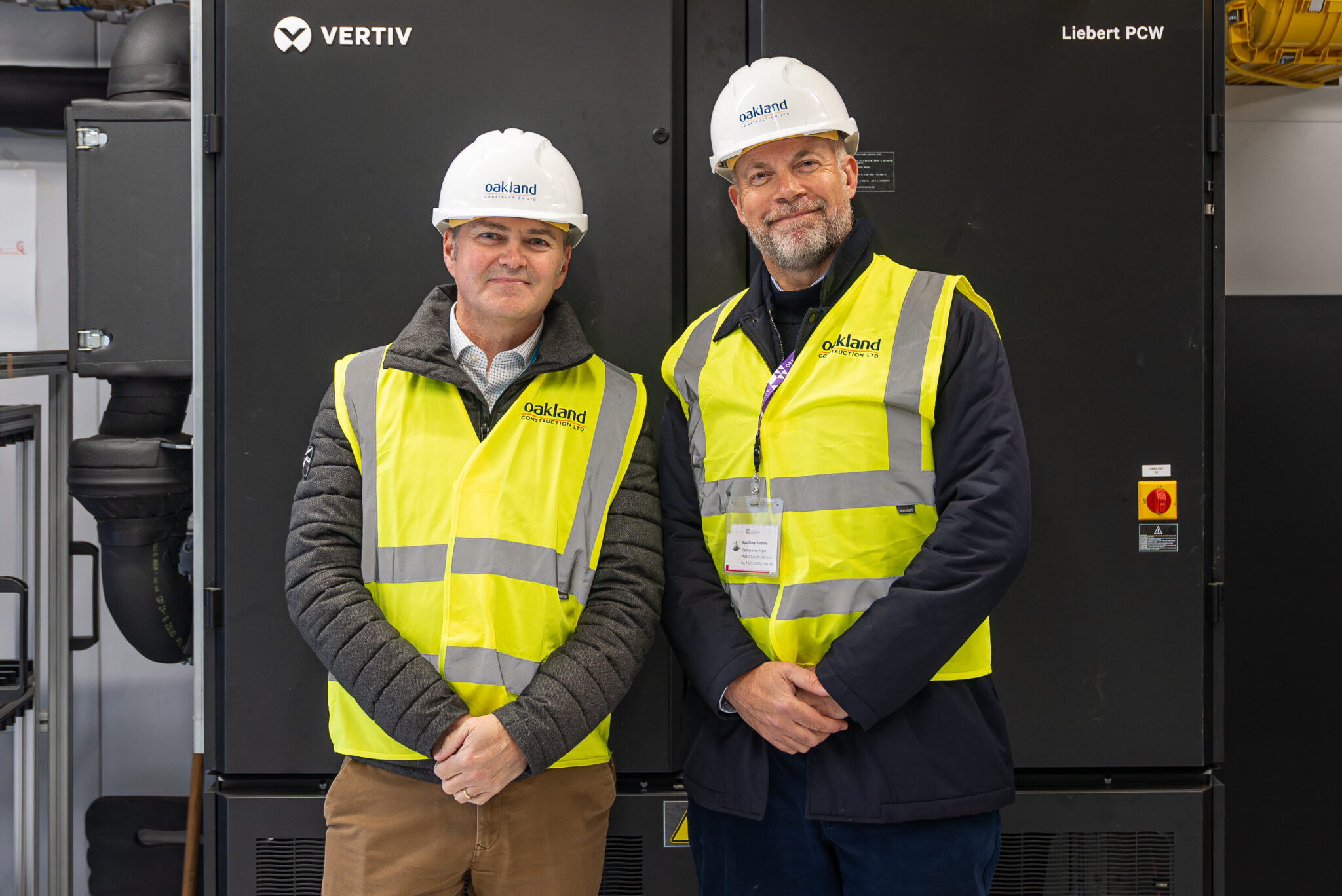 Simon McIntosh-Smith, director of the Bristol Centre for Supercomputing, with Simon Appleby, AI business lead at HPE.
Simon McIntosh-Smith, director of the Bristol Centre for Supercomputing, with Simon Appleby, AI business lead at HPE.
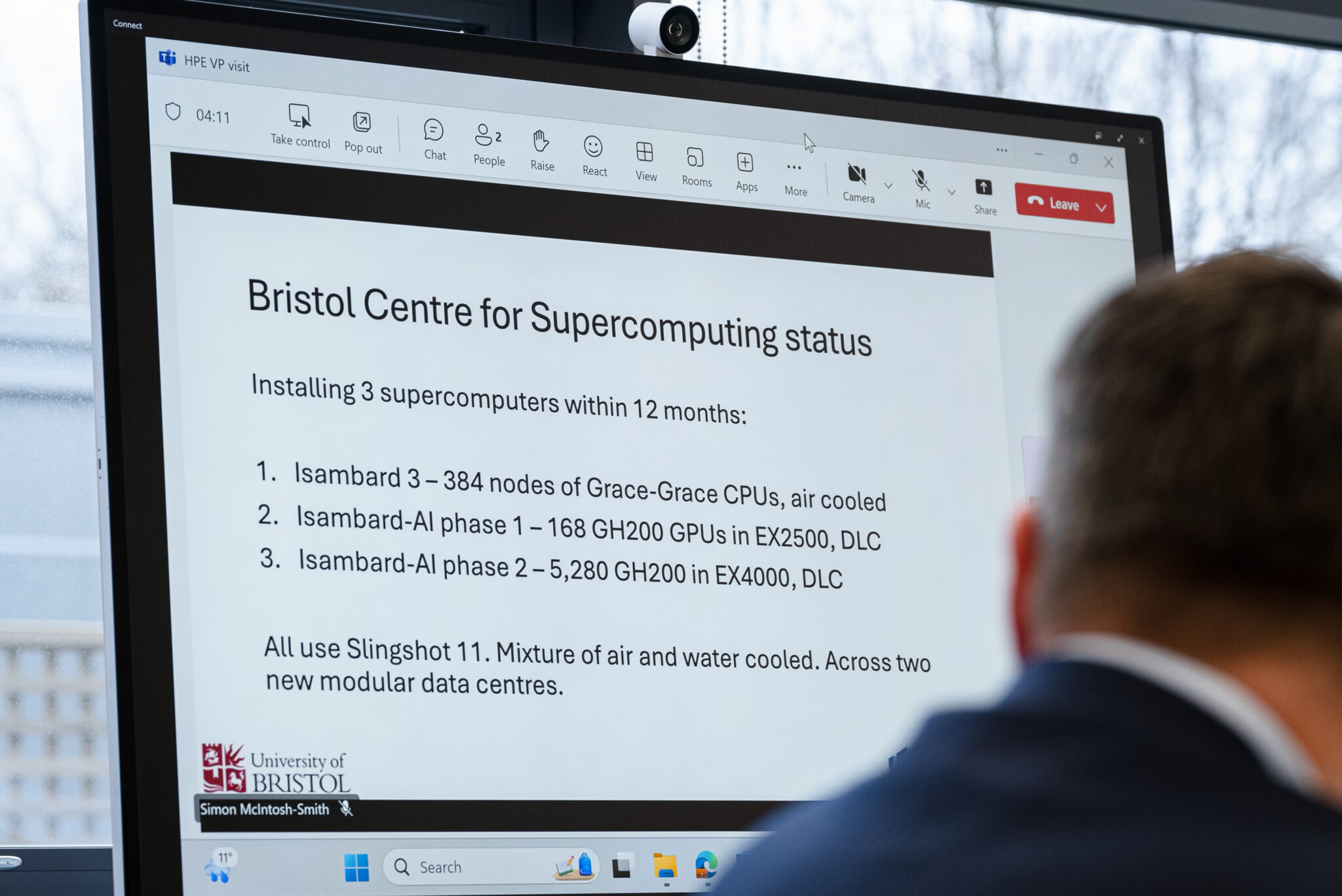 A glimpse into the project’s strategic planning, showing a screen outlining the ambitious goal of installing multiple supercomputers, including Isambard-AI’s phases, within 12 months.
A glimpse into the project’s strategic planning, showing a screen outlining the ambitious goal of installing multiple supercomputers, including Isambard-AI’s phases, within 12 months.
A Turning Point for UK Science
Named after Isambard Kingdom Brunel — the 19th-century engineer who reshaped Britain with railways, bridges and ships — Isambard-AI brings that same scale of ambition to AI research.
And like Brunel’s projects during his era, it moves fast. Having gone from conception to deployment in just under two years, including the construction of the modular data center in 48 hours, the supercomputer is already running live projects aligned with national priorities.
Early flagship projects include:
- Nightingale AI: A sovereign, multimodal health foundation model trained on National Health Service (NHS) data to support earlier diagnoses and personalized care.
- BritLLM: A U.K.-developed LLM project supporting British languages like Welsh, alongside English, to promote inclusivity and better public service delivery in healthcare, education and public services.
- UCL Cancer Screening AI: Developing the first scalable AI system for prostate cancer detection via MRI, aiming for faster diagnoses and tailored treatments.
- EIMCRYSTAL (University of Liverpool): Using AI to search 68 million chemical combinations to discover greener, more sustainable industrial materials — reducing reliance on rare or toxic inputs.
- EgoAI (University of Bristol): Using AI to analyze recordings from wearable cameras and other smart devices to help people perform tasks better at home. This holds immense promise for assisting dementia patients in the future.
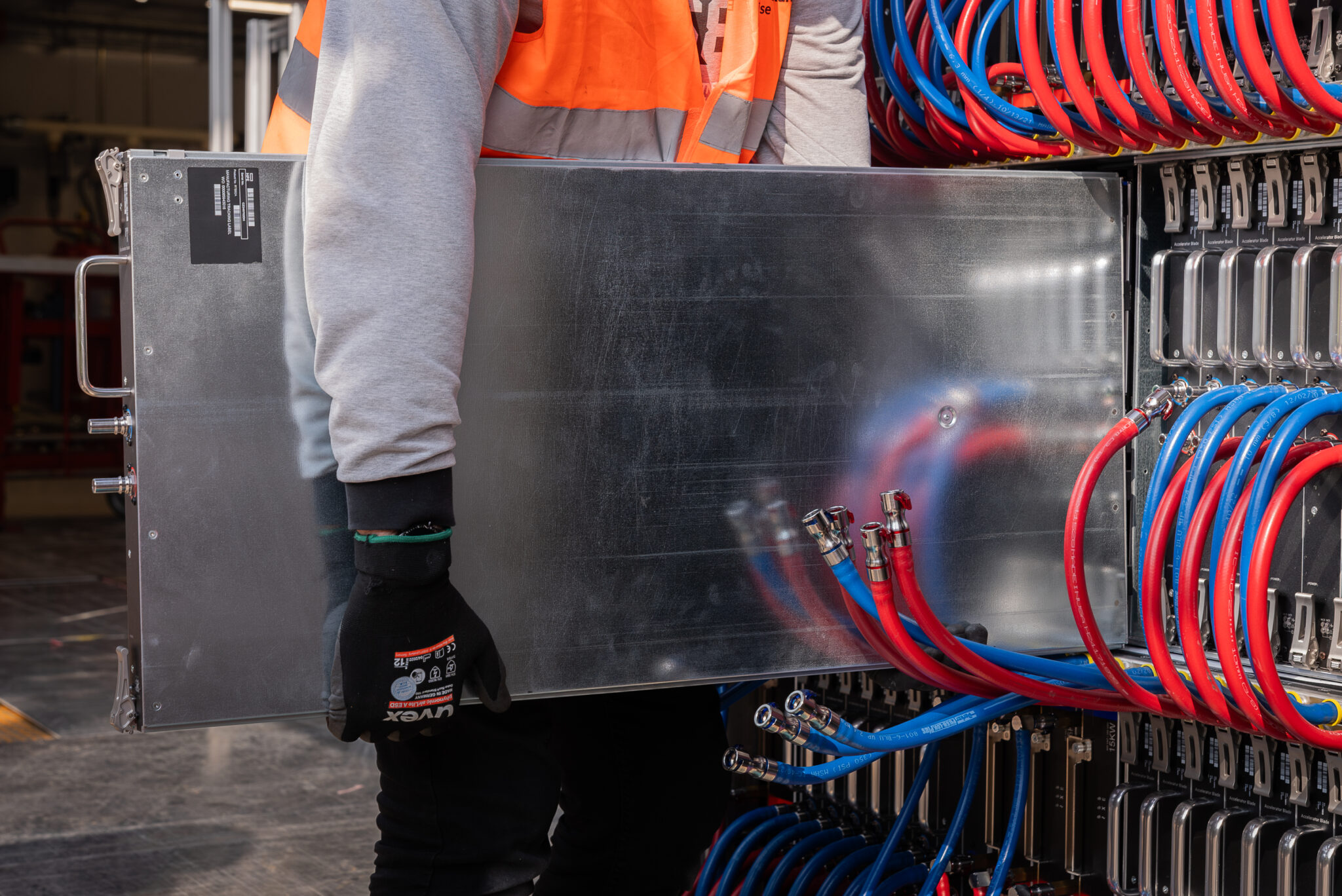
A technician carefully installs a server blade equipped with direct liquid cooling, demonstrating the hands-on precision involved in assembling Isambard-AI’s advanced computing infrastructure.
Built Fast, Built Smart
How do you build a supercomputer in half the usual time?
“We treated the project like a high-performance processor,” said Simon McIntosh-Smith, director at BriCS. “We executed everything in parallel.”
Key to this speed:
- Parallelized project management
- Early procurement of critical hardware, particularly GPUs
- Prefabricated modular data halls shipped in and assembled in days
- Relentless optimization of delivery timelines
- Ground broke in June 2024. By June 2025, the full 5-megawatt system was live: built, tested and running at a global scale.
COUNT
Smart launches revamped Online Store, rolls out Postpaid Plan 799

9:43 p.m. July 7, 2025
Mobile services provider Smart Communications, Inc. (Smart) is making it simpler and faster for more Filipinos to elevate their digital lifestyle with the launch of its revamped Smart Online Store (https://store.smart.com.ph/), a portal where new and existing customers can conveniently explore and securely avail of the latest prepaid and postpaid offers with just a few taps on their smartphone or computer.
As a special introductory offer, the revamped Smart Online Store is the launch platform for Smart Postpaid Plan 799, a SIM-Only Plan that comes with 15 GB open-access data for all sites and apps, 100 GB of 5G data for six months for use in Smart 5G-covered areas, Unlimited Calls and Texts with Landline Calls, and a complimentary Netflix Mobile subscription.
As an added perk for subscribers who will subscribe to the new Smart Postpaid Plan 799, applications made through the Smart Online Store will receive 50% more open access data (7.5 GB) for the first six months.
Easily sign up for a Smart Postpaid Plan 799
New and existing subscribers can conveniently sign up for Smart Postpaid Plan 799 by simply going to https://store.smart.com.ph/ (https://store.smart.com.ph/), selecting “SIM-Only Plans,” and then choosing “Plan 799.”
Customers must then fill out the required personal information to complete their online application.
Initially available only on the Smart Online Store, Smart Postpaid Plan 799 will also be offered to all Smart Stores nationwide soon.
Value-packed offers at your fingertips
Aside from enabling subscribers to avail of Smart Postpaid Plan 799 with just a few clicks, the Smart Online Store also allows customers to bundle a device with their SIM-Only Plan.
Moreover, Smart Online Store’s intuitively designed portal makes it so much easier for customers to discover other value-packed products and services that suit their lifestyle – from data, call, and text offers, SIMs and eSIMs, to the latest smartphones.
The portal also allows users to reload for credits, avail of limited promos, purchase phones bundled with Smart and TNT SIM cards, buy devices under Smart Bro 5G promos, and order Smart and TNT SIM packages.
Lastly, customers can enjoy a wide range of payment options with priority handling for select credit cards.
The revamped Smart Online Store is just one of the many ways that make Smart simply reliable for Filipino mobile users looking to level up their digital lifestyle and enjoy the many benefits of technology.
Visit the Smart Online Store and sign up for a Smart Postpaid Plan 799 now at https://store.smart.com.ph/.#
COUNT
Mega Sardines: 50 years of serving nutrient-rich meals, primed to go global

10:22 a.m. June 20, 2025
As it celebrates its 50th anniversary, Mega Prime Foods Inc. reflects on a remarkable journey—one that began with a simple mission to provide affordable, nutritious food to Filipino families.
What started as a humble fishing company has now become one of the most innovative and socially driven food manufacturers in Southeast Asia, producing over 3 million cans of sardines daily from its advanced facilities in Batangas and Zamboanga.
Sardines, long a staple in Filipino households, are among the most nutritionally dense foods in the world—rich in Omega-3 fatty acids for brain and heart health, vitamin B12 for metabolic support, and a host of other essential nutrients like calcium, iron, and selenium. Mega Sardines ensures these health benefits are preserved through its industry-leading “catch to can in 12 hours” process—setting it apart in freshness, quality, and care.
For Chairman and Founder William Tiu Lim, the journey has not been easy. From natural disasters like the devastating 1970s typhoon that destroyed much of their fishing fleet, to political and economic crises, Mega has endured and grown stronger. Through it all, Tiu Lim held fast to three core values: Quality, Innovation, and Malasakit—a uniquely Filipino term meaning selfless concern for others.
“We’ve always aimed for the best possible quality,” said Tiu Lim. “Our fish go from sea to can in just 12 hours, compared to the industry’s usual 1–3 days. That freshness is our edge.”
This commitment to innovation and excellence recently culminated in a global milestone: Mega Sardines was designated a “Superfood” by the Medical Wellness Association (MWA), becoming the first seafood product ever to receive the distinction. The recognition was awarded during Mega’s 50th anniversary celebration by MWA Board Member and faculty member James Michael Lafferty, underscoring the brand’s role in promoting global wellness.
“I was honored to announce Mega Sardines as the world’s first seafood Superfood,” said Lafferty. “It’s a testament to their quality, innovation, and mission to improve health outcomes.”
As the company transitions into its second generation of leadership under President and CEO Michelle Tiu Lim-Chan, the vision for global expansion is clear—but rooted in the same human values that built the brand.
“We are people-first,” said Lim-Chan. “We serve our customers, support our employees, and provide opportunities to improve lives. Growth is not just about geography—it’s about purpose.”
Mega Prime Foods is already expanding its product lines, offering not only sardines but also tuna, mackerel, fruit cocktails, coconut gel, Primo non-alcoholic sparkling juices, and the Jimm’s Coffee functional beverage line.
“Our proudest achievement is our ability to turn compassion into tangible, quality products,” Lim-Chan added. “We are not done yet. The next 50 years will be even more exciting.”


















